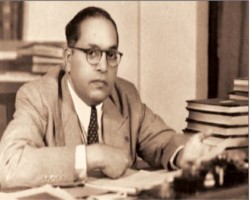UPSC Current Affairs
| History |
|---|
|
|
|
Subject: History
(Relevance: BR Ambedkar’s contribution to the drafting of the Indian Constitution is a significant part of the UPSC syllabus. His works and quotes are frequently used in Mains answer writing to substantiate responses. UPSC has often asked questions about his political organizations, key writings, and his fight against the caste system. Therefore, it is crucial to have a thorough understanding of this topic.) Why in the news? Recently, during the debate in the Rajya Sabha on the “Glorious Journey of 75 Years of the Constitution of India,” a statement by Home Minister Amit Shah triggered an uproar in Parliament. This incident highlights the significance of Ambedkar’s idea of social justice and his role in the drafting of the Constitution in the limelight. Key Takeaways: 1. On August 30, 1947, the Drafting Committee headed by Dr. B. R. Ambedkar had its first meeting and within 165 days, the committee prepared a draft of the Indian Constitution. It took 11 sessions spread over 165 days for the committee to bring about 395 articles, eight schedules, 7,635 amendments (tabled) and 2,473 amendments (moved). 2. Ambedkar presented this draft to the Constituent Assembly on November 4, 1948. He explained why the parliamentary system of government was preferred to the presidential form that prevailed in the United States. India was also to have a federal structure but with greater power being given to the Union. 3. Ambedkar’s legal expertise and knowledge of the constitutional laws of different countries guided him in the drafting of the Constitution. He is regarded as the architect of the Indian Constitution. His major contributions can be seen in the area of Fundamental Rights, strong central government and protecting the rights of minorities. 4. Being the chairman of the Drafting Committee, Ambedkar had faced criticism for ‘delays’ in finishing its work and ‘wasting public money’ in the entire exercise. Ambedkar had to justify his stance as the chairman of the committee and gave illustrations of other countries consuming more time while drafting their Constitutions. Second reason he told the assembly was that unlike all other countries, the Indian Constitution was the most extensive and lengthy. . In the concluding remarks in the Constituent Assembly on November 25, 1949, Ambedkar voiced several fears regarding the future of the country. 📍’Will India lose her independence again?’ “Will history repeat itself? It is this thought which fills me with anxiety. This anxiety is deepened by the realisation of the fact that in addition to our old enemies in the form of castes and creeds we are going to have many political parties with diverse and opposing political creeds. Will Indians place the country above their creed or will they place creed above country? I do not know. But this much is certain that if the parties place creed above country, our independence will be put in jeopardy a second time and probably be lost for ever,” Ambedkar said. 📍’India has known democracy before, will it remain democratic?’ Ambedkar in his speech talked about how democracy was not a new concept for India but had existed in ancient times. “There was a time when India was studded with republics… It is not that India did not know Parliaments or Parliamentary Procedure. A study of the Buddhist Bhikshu Sanghas discloses that not only there were Parliaments — for the Sanghas were nothing but Parliaments — but the Sanghas knew and observed all the rules of Parliamentary Procedure known to modern times.” He then went on to caution against hero-worship, or bhakti, of one leader. “There is nothing wrong in being grateful to great men who have rendered lifelong services to the country. But there are limits to gratefulness… in India, Bhakti or what may be called the path of devotion or hero-worship, plays a part in its politics unequalled in magnitude by the part it plays in the politics of any other country in the world. Bhakti in religion may be a road to the salvation of the soul. But in politics, Bhakti or hero-worship is a sure road to degradation and to eventual dictatorship,” he said. Ambedkar’s quote ‘… agitation is incomplete without the strength of women’ 1. Dr. B R Ambedkar, a strong advocate of women’s rights and empowerment in India, has famously said, “Unity is meaningless without the accompaniment of women. Education is fruitless without educated women, and agitation is incomplete without the strength of women.” 2. Ambedkar’s advocacy of women’s rights offers a striking reminder of why gender equality is essential for building a just society. Most importantly, his vision of women’s empowerment is of paramount significance for UPSC Essay writing and can be embedded in discussions on women’s role in national movements and protests. |
| >> More UPSC Current Affairs |
